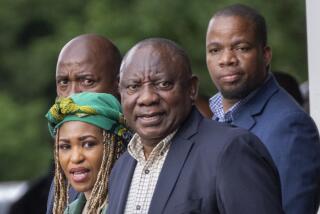Kenyans Pin Hopes on Change at Top
- Share via
GATUYA, Kenya — Justus Maina, a 61-year-old tea farmer who lives in this village near snowcapped Mt. Kenya, has few reasons to be happy. The village lacks running water, its narrow roads are unpaved, and he receives pennies for the crop he sells to a local cooperative.
But these days, Maina and his neighbors are giddy with hope. They are counting on a former villager, opposition leader Mwai Kibaki, to deliver them from decades of misrule by winning Friday’s presidential election. Analysts and polls suggest that barring electoral fraud -- which is common in this East African nation -- Kibaki could storm to victory over Uhuru Kenyatta, the 42-year-old handpicked successor of President Daniel Arap Moi.
Moi is legally barred from seeking reelection. He has ruled Kenya since 1978, when independence hero Jomo Kenyatta, Uhuru’s father and the nation’s first president, died. Many Kenyans are counting on Kibaki, who served as Moi’s vice president for a decade until 1988, to lead Kenya out of its worst economic decline since independence, rescue it from rampant corruption and restore the aspirations of a nation once described as one of Africa’s brightest hopes.
As a lecturer at Makerere University in Uganda, Kibaki, 71, earned a reputation as one of East Africa’s brightest economists. As a businessman and government minister, he struck deals with other ruling party officials that helped him secure large stakes in banks, stores and office buildings. Kibaki is now one of Kenya’s wealthiest politicians.
“This is Kenya’s ‘old money’ election,” said John Githongo, who heads the local chapter of Transparency International, an anti-corruption watchdog group. “Kibaki’s money is clashing against Kenyatta’s and Moi’s money.”
Kibaki was not always a member of the moneyed set. He was born in a tiny mud-walled hut in this mountainous village in central Kenya that backs up to Aberdare National Park, where tourists now flock to see antelope, elephants and black leopards. Kibaki helped his father, a small tobacco farmer, herd and milk the family’s cows. But he was mainly interested in his studies, and he became a darling of the teachers at the local school.
Former classmates say Kibaki was particularly adept at mathematics. Businessmen sought him out to make calculations, said Elizabeth Wangui, a longtime Gatuya resident. One of Kibaki’s teachers, a Roman Catholic nun, predicted that he would one day become a great leader, according to Nderitu Gatu, a former classmate.
“It is a prophecy that is going to come true,” Gatu said. “He had a great ability to organize other students and was trusted by teachers to even solve disputes among them.”
In the 1950s, Kibaki earned degrees in economics and political science at the London School of Economics and went on to become a lecturer at the Ugandan university.
He returned home in the early 1960s to join the independence movement, held a variety of ministerial portfolios and was elevated by Moi to the vice president’s job. Over the years, Kibaki became known as a bright but unenergetic leader who took few risks. He remained Moi’s sidekick even though the Kenyan strongman marginalized the Kikuyus, the country’s largest ethnic group, to which Kibaki belongs.
In the 1980s, when activists demanded that Moi end one-party rule, Kibaki mocked them, saying they were daydreamers trying to cut down a fig tree with a razor blade. But Kibaki formed the Democratic Party in 1991, joining supporters who had long abandoned Moi’s Kenya African National Union. He lost elections to Moi in 1992 and 1997.
In the first decade after independence in 1963, Kenyans were about as prosperous as people of Asian countries such as South Korea and Singapore. But today, the average Kenyan earns about $300 a year -- the same as in 1963. More than half the people live in dire poverty. About 40% are unemployed.
Critics say that Moi’s relatives, government ministers and other cronies have systematically looted the country’s treasury. International lending agencies are currently withholding hundreds of millions of dollars until the government makes meaningful efforts to stem corruption.
Little has changed for Maina and other villagers here since independence. They still toil on tiny plots of land. Maina says the small amount he receives for his tea is not enough to buy food or to send his children to school.
Down the street, Bernard Nderitu runs a sparsely stocked dry goods shop and says he makes just enough money to feed his wife and five children. Pointing at the empty shelves, he said: “Times are very bad, very bad. A few years ago, business was thriving, and everyone was happy. Now, we have been reduced to this.”
Kibaki has promised that his National Rainbow Coalition -- an alliance of opposition parties that was hastily cobbled together -- will transform Kenya into a land of plenty that is free of corruption. He has promised free primary school education and has vowed to create hundreds of thousands of jobs through initiatives that include revitalizing the agricultural sector.
But Githongo, the anti-corruption crusader, who is also a local commentator, said Kenyans should not expect too much of Kibaki.
“If he wins, Kibaki will be a caretaker, overseeing a transitional stage in Kenyan politics,” Githongo said. “There will probably be less corruption and better management, but right now he is being swept up in this momentum of change.”
*
Times staff writer Maharaj reported from London and Nairobi and Mwangi from Gatuya.
More to Read
Sign up for Essential California
The most important California stories and recommendations in your inbox every morning.
You may occasionally receive promotional content from the Los Angeles Times.










